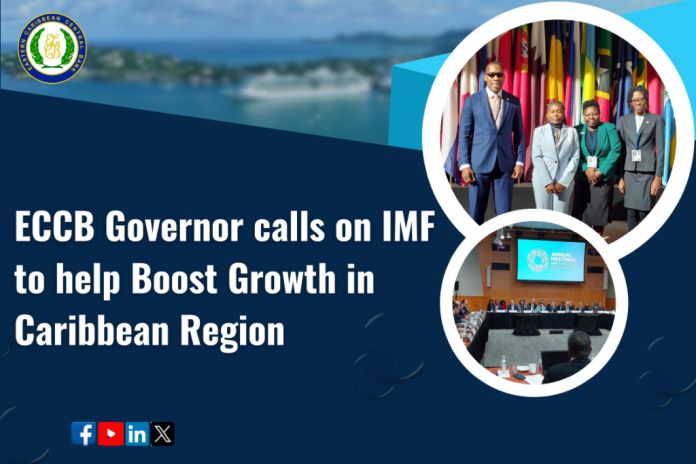BASSETERRE, St Kitts – Governor of the Eastern Caribbean Central Bank (ECCB), Timothy N. J. Antoine, has called on the International Monetary Fund (IMF) to work collaboratively with the Eastern Caribbean Currency Union (ECCU) and the wider Caribbean to boost economic growth, identifying four key areas: (i) Research support on The Big Push; (ii) Accelerating the Renewable Energy transition; (iii) Digital Transformation; and (iv) Financial Protection.
Governor Antoine made the request while delivering remarks at the Caribbean ministerial meeting with IMF managing director, Kristalina Georgieva, convened under the theme: “Potential Growth in the Caribbean: Taking on Enduring Challenges and Emerging Opportunities.”
Members of the ECCB delegation to the 2024 Annual Meetings of the IMF and World Bank Group included, Dr Tracy Polius, chief director (Policy), Dr Emefa Sewordor, senior policy specialist and head of advisory services in the governor’s office and Juletta Edinborough, acting director, research, statistics and data analytics department.
The event was an important high-level engagement between Caribbean ministers of finance, central bank governors and the top leadership of the IMF. It took place as part of the 2024 Annual Meetings of the IMF and World Bank Group currently underway in Washington, DC.
Early last year (at the launch of ECCB’s 40th-anniversary celebrations), Governor Antione issued a challenge for the ECCU countries to consider what it would take to double the size of their economies over the next decade, a challenge which he styled: “The Big Push.” It is against this backdrop that the governor highlighted the four areas of collaboration which he believes would take the region closer to achieving the challenge.
Governor Antoine stated: “We cannot transform the Caribbean with energy costs of 35 – 40 US cents per kilowatt-hour. We have some of the highest electricity rates in the world.”
The governor pointing out that about 90.0 percent of energy in the region still comes from fossil fuels, and that the ECCB has started to address this issue through the Renewable Energy Infrastructure Investment Facility (in partnership with the World Bank) and during the first phase of the initiative has identified key reasons why the energy transition is not moving faster.
These include policy and regulatory gaps; small project sizes that are unattractive to the private sector; weak capacity within both the public and private sectors; and the unreadiness of grids.
In terms of financing, Governor Antoine identified the Loss and Damage Fund and called on the IMF to continue its strong advocacy for Small Island Developing States (SIDS), many of which are in the Caribbean. In 2022 at COP27, countries agreed to establish new funding arrangements for assisting developing countries that are particularly vulnerable to the adverse effects of climate change. In the following year, at COP28, countries reached a historic agreement on the operationalisation of the Fund. Governor Antoine said that it is important for our countries to access financing through the Fund in order to build climate resilience.
Governor Antoine added that digital transformation is critical to the region’s development thrust and requested that the IMF work closely with the region to conduct research on assessing both the financial stability risks as well as labour market implications of Artificial Intelligence (AI); stressed the need for a pro-worker AI for the Caribbean.
With respect to financial protection, Governor Antoine cautioned that there is a real danger of un-insurability arising in the Caribbean, which is a hindrance to building resilience. The governor stated that the risk of not getting insurance, because it is either unavailable or unaffordable, could become a serious challenge for homeowners and hotels in the region and cited the situation with homeowners insurance in Florida, USA; called on the Fund to support the region with analytical work on the impact of climate on financial protection and financial stability.
- Source: ECCB





